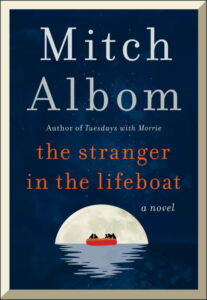REVIEW: “The Stranger in a Lifeboat” by Mitch Albom.
What would you do if you encountered God, seemingly the same as any other person, and He offered to save your life as long as you believed in Him? Would you believe? What would it take?
These are the questions at the core of Mitch Albom’s new novel, “The Stranger in the Lifeboat,” Published by HarperCollins. After the destruction of the Galaxy, a yacht containing the world’s richest and most famous, ten survivors of varying backgrounds are stranded on a life raft in the middle of the sea. Their survival is chronicled by narrator Benji, who has his own connection to the destruction of the ship.
It’s not Albom’s most emotionally moving book, despite its lofty material, but it is a well-paced mystery that considers important theological questions. Albom cites a handful of people in his life for inspiring parts of the answers to these questions, including his late Detroit pastor.
A sports journalist and author of nine books, Albom is most known for his bestselling 1997 memoir “Tuesdays with Morrie.” It’s this memoir in particular that solidified Albom’s ability to write about the complexities of life and the lessons to be learned from it.
His other recent nonfiction novel, “Finding Chika,” is similarly moving: Albom and his wife, Janine Sabino, run the Have Faith Orphanage in Haiti, and Chika was a girl who lived with them in America for two years while they searched for treatment for a rare brain tumor. The book is outlined by the seven lessons Albom learned from Chika.
Albom’s fiction novels also often contain spiritual and religious messages. His first, “The Five People You Meet in Heaven,” and others, like “The First Phone Call From Heaven,” feature faith and the afterlife prominently.
“The Stranger in the Lifeboat” is no different. As each of the survivors of the lifeboat grapples with the seeming inevitability of their death, the regrets of their life and whether to trust the strange man in their raft who calls himself the Lord, they also grapple with greater themes of faith and forgiveness.
Albom’s storytelling, as is his style, is segmented between various storylines that eventually converge.
Readers travel between land and sea with the occasional inserted news coverage. On the sea, Benji writes to his departed wife Annabelle in a notebook. On land, after the discovery of the life raft from the ship, a local inspector finds that notebook and seeks to uncover its mysteries.
In the raft, Benji and the passengers — most of whom are not religious from the start, or who have fallen away from faith — are distrustful of the man who calls himself the Lord. Yet the only way they can be saved is if they believe.
READ: Our faith is made for difficult times
 Despite that, the survivors remain by and large cynical — even when miracles come from the Lord in the form of fresh water and the extended life of one of the party. In fact, maybe the only person who does believe is the young child Alice, who shares all of her rations with the Lord and watches him with quiet devotion. “There is no faith like the faith of a child,” as Benji writes.
Despite that, the survivors remain by and large cynical — even when miracles come from the Lord in the form of fresh water and the extended life of one of the party. In fact, maybe the only person who does believe is the young child Alice, who shares all of her rations with the Lord and watches him with quiet devotion. “There is no faith like the faith of a child,” as Benji writes.
It’s Alice who readers are encouraged to model themselves after, much like people of faith are encouraged to follow the example of children in the Bible. Alice’s generosity, simple faith, and care for others are what bring her the closest and quickest to that redemptive belief.
Benji is the only person on the raft who learns that kind of belief for himself throughout the course of their survival mission. He also heals from past tragedy and learns to forgive.
May you never find yourself in a situation so dire as being stranded on a life raft in the middle of the ocean. If you do, “The Stranger in the Lifeboat” has a key piece of advice: Believe, and you will be saved.
Jillian Cheney is a contributing culture writer for Religion Unplugged. She also writes on American Protestantism and evangelical Christianity and was Religion Unplugged’s 2020-21 Poynter-Koch fellow. You can find her on Twitter @_jilliancheney.
 Metro Voice News Celebrating Faith, Family & Community
Metro Voice News Celebrating Faith, Family & Community










